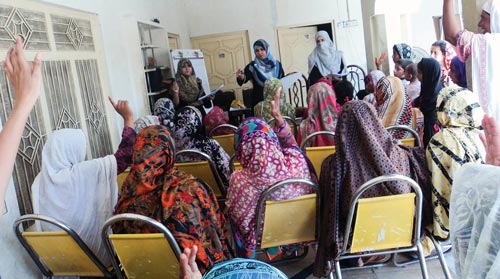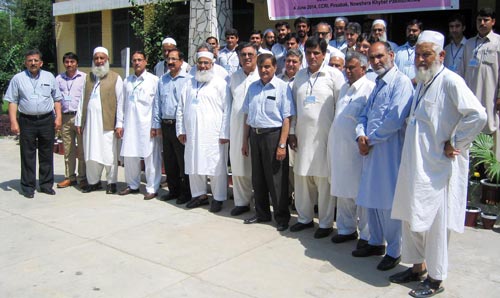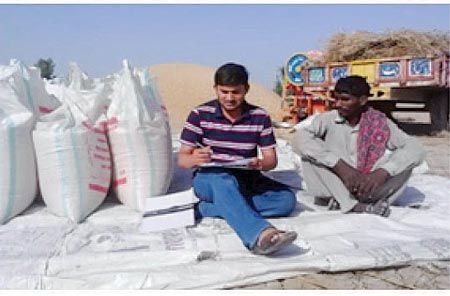The Agricultural Innovation Project (AIP) for Pakistan, led by CIMMYT and funded by USAID, has accomplished a great deal since its inception in March 2013. Among this year’s most notable AIP achievements by partner institutions were numerous training sessions and workshops, important vaccine developments, progress in baseline surveys and advances in seed improvement and distribution.

In May, 25 stakeholders involved in dairy production received training on the seven rapid assessment (RA) tools developed and modified by the International Livestock Research Institute (IRLI). Another 25 stakeholders involved in small ruminant production were given training on the small ruminant value chain rapid assessment (SRVC RA) tools by scientists from the International Center for Agricultural Research in the Dry Areas (ICARDA). On 4 June, a wheat seed value chain workshop organized by CIMMYT in collaboration with the Cereal Crops Research Institute (CCRI) and the Pakistan Agricultural Research Council (PARC) was held at CCRI in Nowshera, Khyber Pakhtunkhwa Province (KPP).
Nearly 50 actors in the wheat seed value chain participated in the workshop, in order to analyze gaps and identify opportunities in the KPP wheat seed system. A “training of trainers” was organized by the International Rice Research Institute (IRRI) on developing and validating a local rice crop check system at Engro Eximp, Muridke, Sheikhupura for seven field staff of the private sector on 24 June.

The World Vegetable Center held a series of customized training workshops with its partners in order to identify gaps, exchange experiences and to further streamline the Center’s activities among public and private partners. Advances have also been made in improved maize seed under the AIP maize component, which evaluated the performance of about 220 recently introduced maize varieties against locally available checks in spring 2014. Preliminary results from the harvested sites show the good selection potential of introduced maize varieties, which consisted of early to intermediate maturity, climate-resilient and bio-fortified white and yellow kernel hybrids and open pollinated varieties.
Best or comparable varieties identified will be further tested to fulfill variety release procedures. With the help of ILRI, the production of the Peste des Petits Ruminants (PPR) vaccine in Pakistan will soon be improved. The version of the vaccine currently produced in Pakistan is thermo-stable at 35˚C, while the version of the vaccine produced by IRLI is thermo-stable at 45˚C and is therefore more resistant to damage and able to be kept at a wider variety of temperatures.
Dr. Jeff Mariner, a former ILRI employee, visited Pakistan in June and conducted a technical audit of the production process in the two laboratories that produce the PPR vaccine. An action plan that includes training and production of a first batch of vaccine based on ILRI’s vaccine composition was created based on this audit, and will be implemented in August in order to help Pakistan create a more heat-resistant variety of the PPR vaccine.
AIP staff members have also worked this year to address the issue of quality fodder for livestock in Pakistan by promoting the growth of spineless cactus on range-land. AIP Livestock, in collaboration with the Rangeland Research Institute (RRI) of the National Agricultural Research Council (NARC), held a farmer’s field day at NARC on 15 May to train farmers in the advantages and methodology of growing spineless cactus. Forty farmers participated, and many have since planted spineless cactus on their lands. IRRI, in collaboration with Engro Exemp, distributed 600 kilograms (kg) of certified, high-yielding Basmati-515 rice seed to 30 farmers in the Punjab region to scale up the adoption of this variety. Basmati-515 has good quality attributes and a comparatively short growing duration, and is an excellent supplement to super basmati, which has lost its yield potential and is also prone to damage by insects and diseases.
One hundred kg of high-yielding, salt-tolerant seed of low phytate rice variety NIAB IR-9 was also distributed to farmers in Usta Muhammad in Balochistan. In addition, IRRI is working to promote mechanized dry rice seeding in Pakistan; a method which uses significantly less water than rice cultivated using the conventional planting method and is much easier to harvest. IRRI scientists, with the help of local farm machinery manufacturer Greenland Engineering, have identified a proper seed drill for direct dry seeding, which they are popularizing through the creation of public and private partnerships.
In addition, AIP reports that baseline surveys for wheat and conservation agriculture as well as vegetables and mung bean value chains are in progress in Pakistan’s four provinces. A maize baseline survey will be launched in August, and will interview more than 500 maize growers. The CIMMYT socio-economics team is also preparing to initiate durum wheat value chain studies in Pakistan, which will target producers, millers, food processors, seed companies, dealers, consumers and restaurants. A total of US $82,829 in funding was awarded to 14 research and extension projects, including: three projects related to grape and mango processing from PMAS Arid Agricultural University, Rawalpindi; seven projects on citrus from a research group at Citrus Research International; and four projects focusing on mangoes from faculty at the Institute of Horticulture and Institute of Food Science and Technology at the University of Faisalabad.
UC-Davis and the AIP Perennial Horticultural Project in-country coordinator will conduct the first review of these funded projects in September. Looking to the future, AIP partners chaired by UC-Davis met in Islamabad in June and created a working group for vocational training, which collaboratively planned cross-institute vocational training activities. The top priorities are to implement a short course on proposal writing that will enable the collaborators to prepare highquality proposals for upcoming competitive grant submissions on AIP call, as well as statistics courses that cater to the specific needs of trials and breeders.
 Capacity development
Capacity development 
